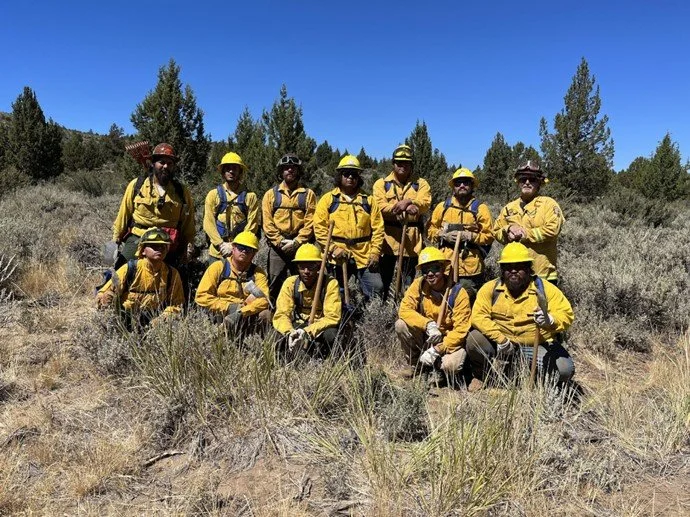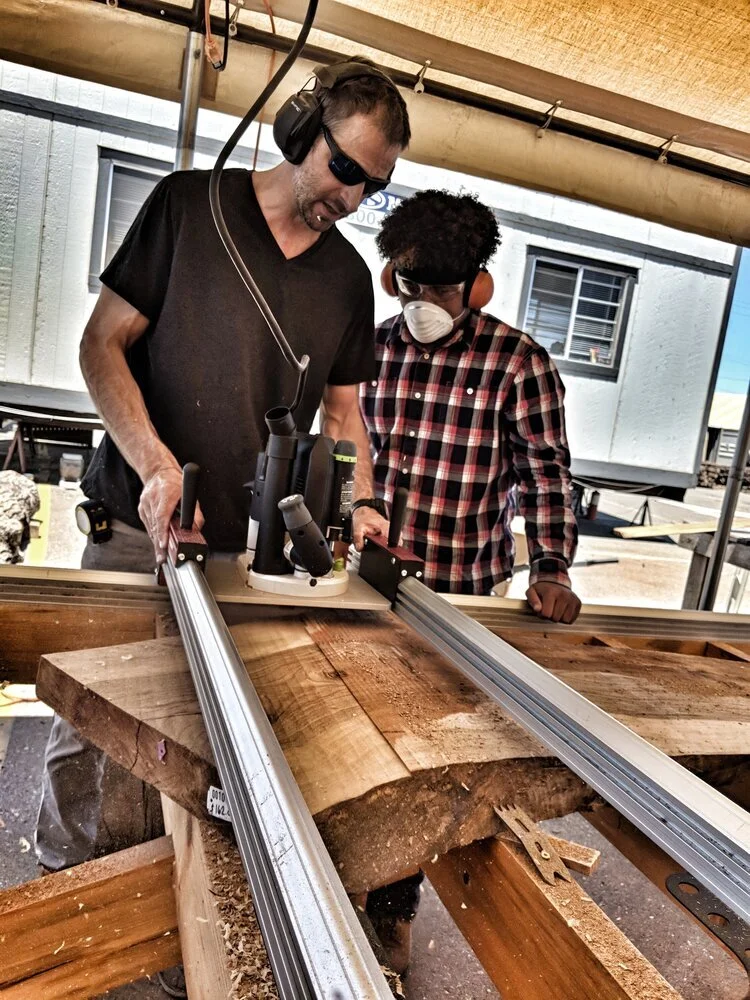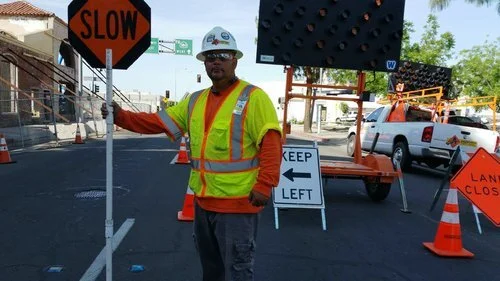With support from California Climate Investments, the California Conservation Corps (CCC) is reducing wildfire risks by removing hazardous fuels in Paradise, Lake Tahoe, and Arcadia as part of the Training and Workforce Development Program. Through fuels reduction projects, Corpsmembers have treated over 90 acres of fire-prone land, creating defensible space and improving community safety. These efforts not only protect residents but also provide young adults with hands-on experience in forestry and wildfire mitigation, preparing them for careers in fire management and conservation.
Funding ZEV Workforce Training and Career Development for Priority Populations
Through the Inclusive, Diverse, Equitable, Accessible, and Local (IDEAL) ZEV Workforce Pilot Project administered by the California Energy Commission and co‑funded by CARB, Fresno City College has offered three high schools in Fresno County the opportunity to introduce their automotive students to ZEV technology. Training was provided in December 2023 for high school teachers at each of the three schools, and they were provided with tools and equipment to offer the new ZEV curriculum starting in spring 2024.
Sierra Institute High Road to Tribal Forest Restoration and Stewardship
California Workforce Development Board
The High Road to Tribal Forest Restoration and Stewardship project provides foundational training and skill building tied directly to work experience in forest health and landscape restoration. Through a partnership between Tribes, nonprofits, and regional employers, the project is working to increase employment opportunities and build capacity for Tribal Forest restoration crews. The project has formally engaged with fourteen Tribes, with training participants from over twenty Tribes.
Kompogas SLO Inc. is Creating Fuel and Compost with Waste
Kompogas SLO Inc. received $3 million through the Organics Grants program to build a high-solids anaerobic digester, to be known as the Lancaster Organic Waste Facility, at the existing Lancaster Landfill and Recycling Center in Antelope Valley. With this new anaerobic digester, Kompogas SLO Inc. will be able to process residential food and green waste collected by Waste Management Inc. throughout Antelope Valley, including in the cities of Lancaster and Palmdale, and turn it into renewable natural gas and high-grade compost.
Expanding Energy Storage and Microgrid Training and Certification
Using $1.25 million from the Low-Carbon Economy Workforce program, the Expanding Energy Storage and Microgrid Training and Certification project is increasing the number of participating Electrical Joint Apprenticeship Training Centers from six to 21 centers located across the State. These training centers will help electricians and apprentices earn a certification demonstrating they have the skills to safely handle and diagnose modern energy storage systems and battery technologies.
New Community Composting Program Sequesters Carbon While Providing Local-Level Benefits
The California Alliance for Community Composting (Alliance)is helping community groups develop or expand 50 community composting sites in disadvantaged and low-income communities across California using funds from the Community Composting for Green Spaces Grant Program. Altogether, these sites are expected to prevent nearly 11,000 tons of organic waste from going to landfills by creating compost, which prevents the release of greenhouse gases during its decomposition. The Alliance’s work will also provide communities with additional benefits, including free compost, job training, and more.
Long Beach Urban Wood Recovery Apprenticeship Program Prepares Youth for the Future Workforce
Funded in part by a nearly $1,000,000 grant from California Department of Forestry and Fire Protection’s Urban and Community Forestry Program, the Conservation Corps of Long Beach (CCLB) is implementing an urban wood recovery apprenticeship program that has the potential to be a model for other programs across California. This program is teaching Corpsmembers how to remove hazardous trees throughout the city, control insects and diseases, and divert woody biomass from landfills to help keep greenhouse gases sequestered in the wood. Additionally, trees will be replaced to mitigate poor air quality, a lack of urban green space, and improve storm water retention in disadvantaged communities. Ultimately, this program will provide a foundation for Corpsmembers interested pursuing jobs in urban forestry.
Next-generation Refrigeration in New Stater Bros. Markets Grocery Store
Thanks to $50,000 from the California Air Resources Board’s Fluorinated Gas Reduction Incentive Program, Stater Bros. Markets installed a climate-friendly refrigeration system at a new supermarket in Whittier that will result in a reduction of greenhouse gas emissions that is the equivalent to taking more than 1,000 vehicles off the road for one year. Since refrigerants are among the fastest growing climate pollutants worldwide it is important to have projects like this one to demonstrate that transitioning the grocery sector toward cleaner refrigerants is an effective strategy for mitigating climate change.
Paving the Way for Zero-Emission Freight Facilities in Long Beach
This program will deploy 38 electric yard trucks, 9 electric gantry cranes, 18 electric heavy lift forklifts, and 15 zero-emission Class 8 trucks. The program is also including a workforce development component with curriculum being developed to support the deployment of this technology with local school districts near the three port locations, community colleges and Long Beach State University.
Greening the Yellow Brick Road Project Transforms Street into a Symbol of Activity and Hope
With $4.1 million from California Natural Resources Agency’s Urban Greening program, this project is helping bring the community’s vision to fruition and will benefit thousands of community residents. The project will create a safe and green public space where neighbors can come together and a designated route for residents to bike and walk in a safe environment.
Urban Wood Rescue Project Trains Youth and Sequesters Carbon
Solar PV and Energy Efficiency Upgrades Benefit Low-income Residents in San Diego
The Allison Apartments, located in San Diego, were completely renovated and energy conserving refrigerators, LED lighting, and heat pump water heaters funded by LIWP were installed. Another CSD contracted partner, GRID Alternatives, installed an 87-kilowatt rooftop solar PV system and provided a workforce development opportunity to ten trainees, nine of whom subsequently found employment in the solar industry.
High-Speed Rail Construction Prioritizes Jobs and Sustainability
The High‑Speed Rail Authority is responsible for planning, designing, building and operating the first high‑speed rail in the nation. When complete, it will run from San Francisco to the Los Angeles basin in under three hours, providing a clean alternative to driving or flying. Funded in part by California Climate Investments, the project is already contributing to economic development and a cleaner environment, creating jobs, and preserving agricultural and protected lands.
High-Speed Rail Project Prioritizes Co-Benefits and Sustainable Construction Practices
High-Speed Rail Project Provides Job Training and Career Advancement Opportunities
Fernando Madrigal, Jr. personifies the opportunities associated with high-speed rail. After 12 years of service with the Marine Corps, Fernando found work as a security guard. He then signed up for a 10-week training program sponsored by PG&E to introduce workers to the various constructions trades.
Pre-Apprenticeship Training Student Lands Job on High-Speed Rail
Microgrid Brings Efficiency and Resilience to Food Processing Facility in Coachella
Expanding the Wholesale Produce Market Recovery Program in Los Angeles
Food Forward, which recovers produce and makes it available to hunger relief agencies in eight southern California counties, is expanding its Wholesale Produce Market Recovery Program. With the help of California Climate Investments, Food Forward will open a new “Produce Depot” near the wholesale produce market in downtown Los Angeles and double its food recovery capacity. In addition to fighting food insecurity in southern California, the project will benefit disadvantaged communities and the environment by supporting jobs and combating climate change.
Closed-Loop Recycling Solutions for Irrigation in the Central Coast
Netafim Irrigation, Inc. received a total of $2,011,647 from California Climate Investment through the Recycled Fiber, Plastic, and Glass Grant Program. This money supports its operations as a closed‑loop recycling solution for used irrigation tubing that serves commercial farming operations in the Central Coast region of California. Netafim’s grant is expanding an established and successful recycling operation. As a result of this expansion in Netafim’s operations, the project is estimated to divert 83,059 tons of material from landfills and reduce greenhouse gas emissions by 66,447 metric tons of carbon dioxide equivalent.





















